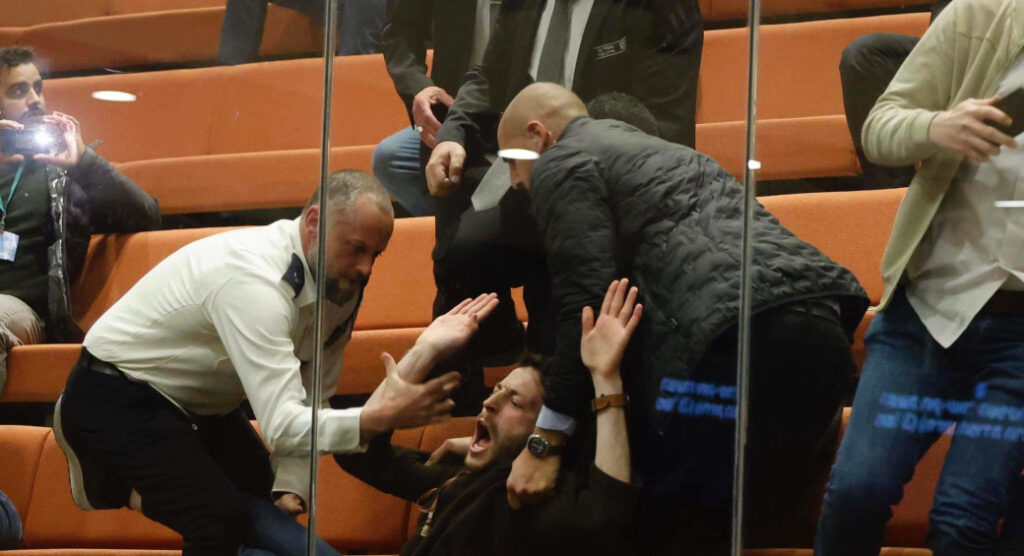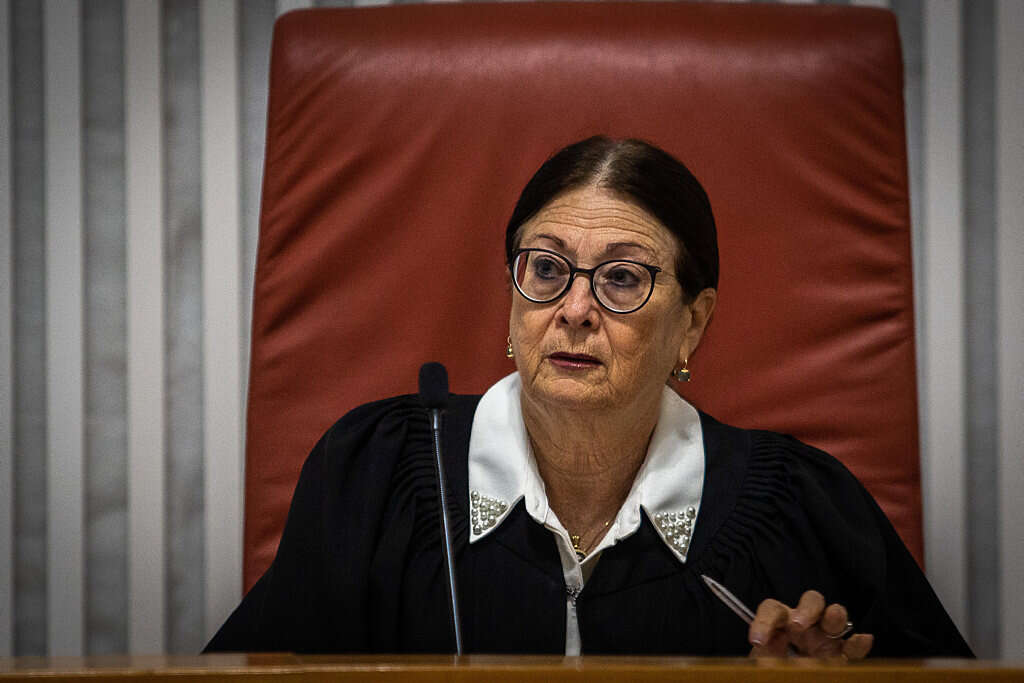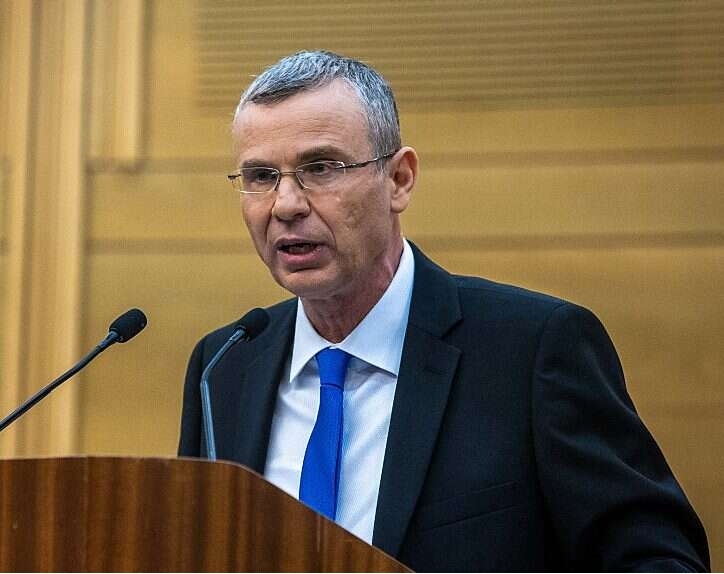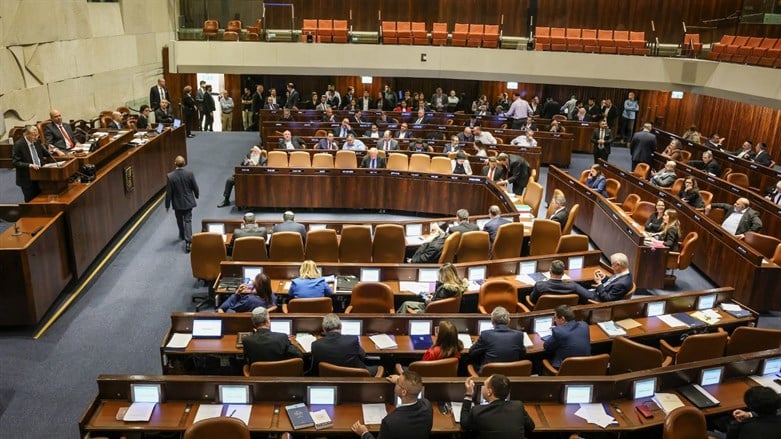Monday night, the process of advancing legislation directed at judicial reform began. Following heated debate, two bills passed their first reading in the Knesset plenum after midnight, each by a vote of 63 to 47.
Members of the opposition did everything they could to block the votes.
There was a large crowd of demonstrators outside the Knesset. A few managed to breach barriers set up around the building and created a disturbance inside the Knesset. They had to be ejected. (This picture is of the visitors’ gallery.)

There were also MKs in the opposition who wrapped themselves in flags; Knesset Speaker Amir Ohana ordered them to be escorted out because of disrespect for the flag.
~~~~~~~~~~
Before looking at the specifics of the bills that have passed their first reading, I want to clarify the situation in broader terms. There is an enormous amount of disinformation out there.
You do a service for Israel when you share this material.
Contrary to what is being claimed in some quarters, the bills that are being advanced now do NOT change a stable judicial situation that has existed for almost 75 years. They address inequities and problems created by Aharon Barak during the period of 1995 – 2006, when he served as president of the Supreme Court.

Barak effectively restructured the Court so that it was given excessive power, destroying the balance between court, legislature and executive. Justice Minister Yariv Levin says that what Barak did was essentially a coup d’état with changes carried out unilaterally without consultations.
Take, for example, the concept of “reasonableness,” which was instituted during Barak’s presidency. As matters stand, the Court does not have to base decisions on law – but can apply the justices’ sense of what is “reasonable.” David M. Weinberg, a senior fellow at the Kohelet Forum, has written that the concept of “reasonableness” has become an “authoritarian” tool that “allows high-court justices to apply elastically their own sensibilities; to re-engineer Israeli society—in their enlightened image, of course.” (Emphasis added)
Law professor Eugene Kontorovich observed recently (in a ZOA Zoom presentation) that the current operating principles for the Court are based on the notion that justices are infallible. (If they think a ruling should go a certain way, they must be right.) That, of course, is not the case. Like everyone else, justices are fallible human beings. As it happens, they are also human beings with leftist predilections.
It is essential that there be checks on the Court in order to reestablish a balance between the three branches of government. This is what the reforms are about.
~~~~~~~~~~
Weinberg provided examples of the application of “reasonableness” that are disturbing. But I have one that probably tops them all:
Amiram Ben Uliel was convicted of arson in the village of Duma that killed three people. The conviction was based solely on a confession extracted via torture, a confession he later retracted. Amiram’s lawyers appealed that ruling, petitioning the Court to overturn the conviction, but the Court let it stand.
His lawyers then petitioned the Court for another hearing – another appeal, with a larger Court including more justices. (The number of justices is not always the same.)
Early in February, the ruling came down: President of the Court Esther Hayut said the original conviction would stand and there would not be another appeal. She wrote in her ruling that: “…the means used against the petitioner [Ben Uliel] during his interrogation were certainly extremely irregular…” but denied the appeal because no new legislation had been introduced.
What is an “extremely irregular interrogation“?
Her statement is an acknowledgement that torture was employed; she simply avoided use of the term.

~~~~~~~~~~
Now see what is written in Israeli law, Section 12 of the Evidence Ordinance:
“Evidence of the defendant’s confession that he committed an offense will only be admissible if the plaintiff brought testimony regarding the circumstances in which the confession was given and the court deemed that the confession was free and voluntary.”
How was it possible, then, that Hayut allowed the conviction to stand? That she permitted this terrible miscarriage of justice to persist without granting another hearing??
Because she decided to, is the painful answer.
The fact that it happened is powerful evidence of the need for Court reform, the need to reduce the latitude justices now have in making decisions.
Writes Weinberg: “…these much-too-powerful actors have upset Israeli democracy by usurping powers to themselves never intended by Israel’s founders or parliamentarians – powers that extend far beyond those held by the legal system in any other democracy.” (Emphasis added)
https://www.jpost.com/opinion/article-728411
The changes being brought forward, then, will not reduce democracy in Israel, they will strengthen it and make the Israeli judicial system more like that of other democracies such as the US.
Said Justice Minister Yariv Levin (Likud) on Monday night: “I hear the false claims about the end of democracy. You know deep down that what we’re doing is to restore democracy and return Israel to the family of democratic nations.” (Emphasis added)

~~~~~~~~~~
I mention above that the members of the Court have a predilection for leaning left in their rulings. How this has happened can be understood when we look at what has been the selection system for new justices.
Judges are selected by the Judicial Selection Committee which is composed of nine members: the Minister of Justice (who chairs the Committee), another cabinet minister, the President of the Supreme Court, two other justices of the Supreme Court, two members of Knesset, and two representatives of the Israel Bar Association.
The three members of the Supreme Court and the two members of the Bar Association, who vote with them, formed a controlling majority of the nine votes. What happens is that the justices and their supporting Bar Association members have consistently selected new justices who reflected the same political orientation as their own – and it has been consistently a left-wing orientation. They are a closed clique and in essence have continued to replicate themselves.
There is constant talk about democracy being trampled. But was it democracy when the Court only reflected one political perspective?
As MK Simcha Rothman (RZ) put it on Monday night: “Only those who ‘have the right stuff,’ only those who ‘are part of the family’ are eligible to become a judge in the Supreme Court.”
~~~~~~~~~~
One example of a great many regarding leftist positions exhibited by the Court: I wrote recently about a law passed that will allow Israel to remove citizenship from Israeli Arab terrorists who take “Pay for slay” money from the PA. These terrorists might then be deported to PA areas or Gaza. This was not the first time there was an attempt to pass such legislation. On a previous attempt, the Court said, yes, citizenship could be revoked for a terrorist, but he had to be given residency rights. This defeated the entire purpose. Let’s hear it for civil rights for terrorists!
~~~~~~~~~~
And so, one of the bills that passed the first reading Monday night dealt with changing the composition of the Selection Committee. There would still be nine members, but now the majority of those members – six – would be elected officials and members of the public. The Bar Association would no longer be represented but would be replaced by two public representatives chosen by the Justice Minister.

Again, this enhances democracy. In many if not most democracies, the people directly or via their elected representatives choose the justices. In the US the president nominates, and the Senate must confirm Supreme Court justices. The selection process here in Israel circumvented the will of the people. With this bill, that would no longer be the case.
~~~~~~~~~~
The other bill that passed its first reading on Monday concerned an amendment to “Basic Law: The Judiciary” that would prevent the Supreme Court from invalidating basic laws, which have quasi-constitutional status in Israel.
~~~~~~~~~~
The bills will now be returned to the Constitution, Law and Justice Committee, chaired by MK Simcha Rothman (RZ), for review and revisions before the second and third readings.
Prime Minister Netanyahu, MK Simcha Rothman, and Justice Minister Yariv Levin (Likud) all called for the opposition to come and negotiate revisions.
On Tuesday, Prime Minister Netanyahu said:
“I hear the voices of the people. I hear those who are praising [the judicial reforms] and I also hear those who are concerned. When there are disagreements among us, it is possible and necessary to talk in order to reach agreements or at least reduce the disagreements among us.
“It is within reach. I believe that we can do this, but it requires one basic thing from everyone. It requires leadership and national responsibility. I am obliged to give all the backing and support necessary in order to reach agreements, but to do so it is necessary to stand up and talk. Unfortunately, as of now, nobody on the other side has stood up,” he continued.
“[So] I am standing up, and I am calling out from here: Come and let’s talk—here and now—with neither pre-conditions nor excuses, so that together we might achieve broad agreement for the good of all Israeli citizens, and for the good of our country.”

In all instances they have been rebuffed. There are charges that they are “not sincere.” If they meant it, says rabble-rouser Yair Lapid (Yesh Atid), they would stop the process.
All of this is nonsense. The opposition has a chance to provide input, but they prefer to make hysterical allegations. If they were sincere, they would at least try to negotiate. Understand that the offer was made to do the negotiations in the office of President Herzog.
~~~~~~~~~~
What we are seeing over the last couple of days is that the opposition has become more shrill and more hysterical, their cries more dangerous. It is not rational when Lapid says that Netanyahu cannot be a leader because the crowds don’t follow him. Implied: the crowds follow Lapid. But they represent a miniscule portion of the nation in spite of what seem like great numbers.
Two days ago, it was made public by MK Elazar Stern (Yesh Atid) that Yesh Atid and Labor were mulling over the idea of mass resignations.

This would cause a crisis, but apparently they don’t care if it manages to stop the legislation. It is my understanding, in any event, that it would not bring down the government. But it would leave Yesh Atid and Labor looking like total fools with no leverage.
I believe this is just a threat and will not be actualized, but that they even consider this is one more indication of how much they truly care about the nation.
~~~~~~~~~~
On Wednesday, three more bills passed their first reading in the Knesset. There will be more to say about them in coming days. What I want to mention here is the “Override Law,’ which would empower an absolute majority of the Knesset – 61 votes – to re-legislate laws struck down by the Supreme Court as unconstitutional.
There is a great deal more to say about this important legislation, which reduces the power of the Court and puts control into the hands of elected members of the Knesset.
https://www.jns.org/three-more-judicial-reform-bills-pass-first-reading-in-knesset/
~~~~~~~~~~
While I want to assure one and all that I believe we will weather this particular political storm and come out stronger for it, I close with a note that is ominous.
“The Knesset Officer has stated that the threat level against MK Simcha Rothman, chairman of the Knesset’s Constitution Committee, has been raised to ‘especially high’, according to a report in Kipa. Yuval Segev from Galei Tzahal radio also reported that the Knesset Officer has ordered the reinforcement of security around Rothman, including the use of a protected vehicle and additional security guards.
“While threats against Rothman are not new, but they have significantly increased following the passing the first reading of his judicial reform bills aimed at improving the method for selecting judges and restoring the balance of power between the branches. This has led to a surge of incitement and hatred against him in the streets and on social media platforms, particularly from the left-wing. The situation has been further exacerbated by open incitement from former left-wing politicians and officials, which has worried security officials.”
Will the crowd that follows Lapid now begin to open their eyes and recognize that it’s time to soft-pedal protests?
~~~~~~~~~~
© Arlene Kushner. This material is produced by independent journalist Arlene Kushner. Permission is granted for it to be reproduced only with proper attribution.
